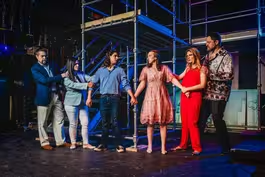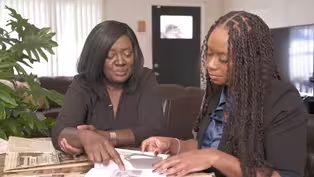
‘The Chinese Lady’ makes its Michigan premiere in Northville
Clip: Season 8 Episode 32 | 7m 14sVideo has Closed Captions
Lloyd Suh’s play about the first Chinese woman to arrive in America premieres in Michigan.
A fourteen-year-old Chinese girl came to America 190 years ago – said to be the first female Chinese immigrant to set foot here during the 1800s. Now a play, “The Chinese Lady” at the Tipping Point Theatre in Northville through March 3, recounts the remarkable life of Afong Moy and her Chinese servant Atung. One Detroit’s Bill Kubota visits a dress rehearsal of the show and talks with the cast.
Problems playing video? | Closed Captioning Feedback
Problems playing video? | Closed Captioning Feedback
One Detroit is a local public television program presented by Detroit PBS

‘The Chinese Lady’ makes its Michigan premiere in Northville
Clip: Season 8 Episode 32 | 7m 14sVideo has Closed Captions
A fourteen-year-old Chinese girl came to America 190 years ago – said to be the first female Chinese immigrant to set foot here during the 1800s. Now a play, “The Chinese Lady” at the Tipping Point Theatre in Northville through March 3, recounts the remarkable life of Afong Moy and her Chinese servant Atung. One Detroit’s Bill Kubota visits a dress rehearsal of the show and talks with the cast.
Problems playing video? | Closed Captioning Feedback
How to Watch One Detroit
One Detroit is available to stream on pbs.org and the free PBS App, available on iPhone, Apple TV, Android TV, Android smartphones, Amazon Fire TV, Amazon Fire Tablet, Roku, Samsung Smart TV, and Vizio.
Providing Support for PBS.org
Learn Moreabout PBS online sponsorship(peaceful music) - [Bill] The Tipping Point Theater in Northville, dress rehearsal.
The play is called "The Chinese Lady."
- Hello, my name is Afong Moy.
It is the year 1834.
I am 14 years old and newly arrived in America.
- When I read "The Chinese Lady" and when I saw it for the first time, it really was one of the first pieces of theater that I completely identified with and made me feel seen.
- My family has sold me for two years of service to Misters Nathaniel and Frederick Carnes, traders of Far East Oriental Imports to New York.
- Well, "The Chinese Lady" follows the story of Afong Moy who we believe may be the first Chinese woman to arrive in the United States in the 1800s.
- [Bill] "The Chinese Lady" by playwright Lloyd Suh first premiered out East in 2018.
Afung Moy, famous in her seating room two centuries ago.
Details of her life are sparse, speculative, so Suh was unbound to give her voice the press accounts back then did not.
- Thank you for coming to see me.
- Not a lot of people know her story, so it's a take on her life story.
But it's also taking creative liberties of what her story means to the present and to the future.
- Shrimp and Chinese vegetables, pot of tea.
- I will eat these foods with chopsticks.
- It follows her journey from that arrival all the way to the end of her sort of visible presence in the public.
But it definitely gives us a glimpse of a woman who was brought to the U.S. as an object for exhibition, as an example of exotic oriental otherness for the education of the American public.
- Her life was a performance.
She did things for the sake of the people looking at her, the gaze.
We talk about the gaze in the show of what people are seeing and not understanding.
- What do you think it feels like?
And they look at me.
They look at my eyes, at my hair, at my face.
They say things to each other.
"Do you think she..." "I wonder if she..." "And my goodness, look at her feet."
- [Bill] Afong traveled the country on display, a human attraction with bound feet, a curiosity with the artifacts her promoters offered for sale.
For a time, Afong appeared with her servant and interpreter named Atung.
- From a 21st century point of view, it's like, wow.
I guess, I don't know.
It must have been because of the times.
But I always marvel at the fact that, you know, these things happened and, to be honest, that it does continue in some way today.
- I am finished, Atung.
- Very well.
- Atung is a servant.
Afong is the person who is brought in as the exhibition, the star of the show.
And they have a contentious relationship.
Because she's a young girl, and they're both in a situation where they don't necessarily want to be there.
They don't have agency over their lives.
And so they only have each other.
- Don't you care about representing your people and your homeland?
- I'm just here to translate.
- Atung is someone that has a voice that maybe he's developed through the years, but is not either allowed to express that voice or even encouraged, you know, to discuss his opinions, his thoughts.
- What are we doing here, Atung?
- I don't know what you mean.
- Is it good what we are doing?
Does it matter?
- I do not think about that.
- Throughout the play, the relationship between Afong and Atung deepen.
He's more comfortable in expressing who he is, his thoughts and his feelings.
- Sometimes when I dream, I dream of China.
But most of the time when I dream, I dream of this room.
In the dream, it is my room.
- I think that's how he finds himself, and he finds himself in this relationship with someone that's in the same situation as him.
- Also in this dream, she cannot speak for me.
No one can speak for me, in the dream or otherwise.
I speak for myself.
- [Bill] Through Atung and Afong, we hear about the Opium Wars, the Gold Rush and the Transcontinental Railroad as more Chinese arrive.
Afong would not be an attraction anymore.
- It is very relevant to Asian American history, but it is super relevant to American history.
Her story is not just one community's story, it's our story as Americans.
So I think with the audience that is coming in, I think it can be a wide ranging variety of backgrounds and they're still gonna walk away with something.
- This is the Michigan premiere of the show.
I grew up in Michigan, so it means a lot to be back in my home state doing this show.
- For many theater artists who go to school here who come up in Michigan, even if they're not Asian, if they're White, they're Black, they're Latino, they're going to go to Los Angeles or New York because that's just the reality of where the industry is.
However, there has been very, very little opportunity for Asian Americans to do work here in Michigan until recently.
And I hope that this is just a beginning.
- Growing up as an Asian American in the Midwest is very different from growing up on the coasts.
And I definitely had a lot of experiences growing up here of being the only Asian person in a class, being the only Asian person in certain spaces.
So to be able to do this show that I hope not only represents the Asian American community here but I hope that a lot of other people identify with, I'm just really excited to see how our audiences respond.
- What do you think it feels like as they look at me?
So let's do that.
Let's look at each other.
- It's wonderful to think that perhaps this could herald something in terms of a changing tide.
- Are you looking at me?
- I think because of the changing population, the changing times, the conversations that people have had... - Can you see me?
- [Jasmine] We're seeing the need for new voices and new people to be heard.
♪ (lyrics in foreign language) ♪ (lyrics in foreign language)
Gospel singer Kevin Stewart performs at Greater Grace Temple
Video has Closed Captions
Clip: S8 Ep32 | 3m 24s | Gospel singer Kevin Stewart performs “Come by Here” at Greater Grace Temple in Detroit. (3m 24s)
One Detroit Weekend: February 9, 2024
Video has Closed Captions
Clip: S8 Ep32 | 1m 49s | Find out what’s happening in and around Detroit this weekend on “One Detroit Weekend.” (1m 49s)
Rose Morton traces her ancestry in ‘Our Family’s Keepers’
Video has Closed Captions
Clip: S8 Ep32 | 6m 8s | Rose Morton unravels her family’s history of slavery in her book “Our Family’s Keepers.” (6m 8s)
Providing Support for PBS.org
Learn Moreabout PBS online sponsorship
- News and Public Affairs

Top journalists deliver compelling original analysis of the hour's headlines.

- News and Public Affairs

FRONTLINE is investigative journalism that questions, explains and changes our world.












Support for PBS provided by:
One Detroit is a local public television program presented by Detroit PBS


